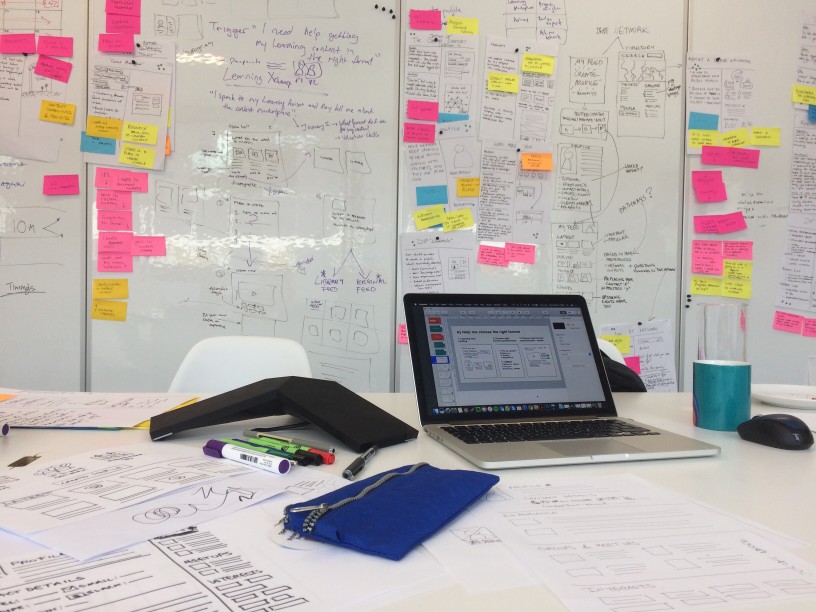Why Simple Software is the Future

Simple software can often serve a specific niche extremely well, but its potential doesn’t stop there. Tools like Velox, Storyblocks, and Teachable, while designed for focused tasks, can be customized and expanded to offer even broader applications. By thinking creatively, businesses can leverage these simple platforms to innovate and meet evolving needs, eventually leading to a point where custom software may become necessary to support unique growth and services.
Considerations for Your Enterprise Application Software

Enterprise software is designed to meet the needs of an entire organization, providing functions such as CRM, business intelligence, and operations management. When developing enterprise software, key considerations include scalability, performance, security, and cost. It’s also crucial to ensure that the software addresses the main pain points within your business and aligns with your overall organizational goals.
What is the difference between Enterprise Software Development and Regular Software Development?

When your business grows too large for manual management, enterprise software becomes essential to automate and streamline operations. Unlike regular software, enterprise software is designed to meet the diverse needs of an entire organization, offering features tailored to various business functions. Custom enterprise software provides visibility, scalability, and a competitive edge, making it a valuable investment for long-term success.
How Microservices Make a Stronger App

Adopting a microservices approach to app development can transform how you build and maintain your application. By treating each function as an independent service, you benefit from faster time-to-market, easier deployments, and enhanced scalability. This modular design ensures that a failure in one service won’t disrupt the entire app, leading to a more resilient and adaptable system.
3 Things to Know About Marketing Your Custom Software

In the fiercely competitive B2B SaaS market, standing out requires more than just great software—it demands a strong, compelling story that resonates with your target audience. Marketing your custom software effectively hinges on focusing on solutions rather than sales pitches, understanding your audience’s specific needs, and leveraging robust digital analytics to refine your approach. Crafting a unique value proposition and aligning it with your brand’s narrative can help differentiate your product in a crowded field.
Trending Now in Custom Software

The pandemic has significantly reshaped custom software development, pushing for more streamlined and focused applications tailored to specific needs rather than one-size-fits-all solutions. As companies adapt to remote work and evolving technology, trends such as simpler apps, targeted software, and the rise of microservices and cloud computing are defining the landscape. Embracing these changes ensures your custom software not only meets current demands but also remains adaptable for the future.
Should Our Company Create a Mobile or Web App? | Custom App

Choosing the right type of custom app for your company can be daunting, but understanding the options is crucial for success. Native apps offer top performance and integration with device functions but come with higher development costs. Responsive websites are cost-effective and accessible across devices but lack the functionality of native apps. Hybrid apps provide a middle ground, balancing cost and functionality but with some limitations on hardware access. Each option has its advantages and trade-offs, so evaluating your needs and budget will guide you to the best fit for your business.
Why Use a Product Manager for Custom App Development?

One common question we get is, “Why do I need a product manager for my custom app development?” It’s a valid concern, especially if you already have a clear vision for your product. However, a product manager is essential for managing the day-to-day details, ensuring that your project stays on track, on budget, and aligned with your strategic goals. While you focus on the big picture, the product manager handles the intricate details, ultimately saving you time, money, and stress.
The Ins and Outs of Startups & Custom Software

Deciding whether to invest in custom software for your startup can be challenging. While it’s tempting to jump straight into building a unique solution, it’s essential to evaluate if it’s the right move for your business. In some cases, like when your business revolves around a proprietary product or there’s no off-the-shelf solution, custom software can give you a competitive edge. However, it’s crucial to start lean, focusing on the minimum viable product (MVP) to get your idea into the hands of users quickly and gather valuable feedback for future development.
Has COVID Changed Software Development?

The stay-at-home orders and social distancing mandates have impacted software development, but perhaps not in the ways you might expect. At Mutually Human, we’re well-equipped to work remotely and continue our consultations virtually. However, the real change has come in the types of software we’re now asked to build—tools that help clients transition from in-person sales to remote or self-serve solutions, ensuring they remain successful in this new normal.
Making Technology More Human

One of the first questions clients often ask us is about our name—Mutually Human—and what it means. It’s a unique name for a technology company, but it embodies our core value: making technology more human. We’re dedicated to creating technology that serves people by understanding their needs and challenges, ensuring that every decision is centered around the human experience.
Questions to Ask a Software Partner Before Getting Started

Finding the right software development partner can feel overwhelming, but asking the right questions can make the process much easier. Start by inquiring about their proven process, their approach to achieving your business goals, and whether they practice human-centric design. Additionally, ask how they will guide you through the development process and how they manage budget and timing to ensure a successful partnership.




